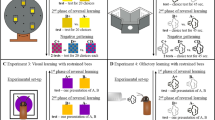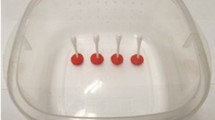Summary
-
1.
The choice reaction of freely flying honey bees which are trained to a spectral colour and tested against an alternative colour is time dependent. Between 3 and 15 min after the reward the percentage of correct choices increases and reaches a steady state. This process is called consolidation.
-
2.
Immediately after single short rewards (2, 5, 10 or 20 sec) the percentage of correct choices is as high as after 15 min of consolidation. The reaction decreases within 2 min and reaches a minimum. The time course of the percentage of correct choices in the honey bee after a single reward is bi-phasic.
-
3.
In the first 4 min after a single reward the choice reaction is negatively correlated with the duration of reward. Short (2 sec) rewards lead to a higher percentage of correct choices than long (10 or 20 sec) rewards.
-
4.
Rewards that last 100 msec or more act as a reinforcement in bees. The phasic response of the taste receptors is sufficient to associate a colour with sugar water. The optimum duration of reward after a single trial is about 1 sec.
-
5.
The memory of the bee after a reward can be impaired by different treatments (electro-convulsive shock, CO2- or N2-narcosis and cooling).
The degree of susceptibility to impairment and the time dependence of the choice reaction until 2 min after the reward are correlated. It is discussed that short-term memory formation in the honey bee is based on different physiological mechanisms which work together.
Similar content being viewed by others
References
Armbruster, L.: Vergleichende Eichungsversuche an Bienen und Wespen. Ein Beitrag zur Messung des mittelbaren Bienennutzens. Arch. Bienenk.3, 219–230 (1921)
Barondes, S. H.: Multiple steps in the biology of memory. In: The neurosciences II, p. 272ff. Ed. F. O. Schmitt. New York: Rockefeller Univ. Press 1970
Beckmann, H. E.: Beeinflussung des Gedächtnisses der Honigbiene durch Narkose, Kühlung und Streß. J. comp. Physiol.94, 249–266 (1974)
Bischoff, H.: Biologie der Hymenopteren. Berlin: Springer 1927
Broadbent, D. E.: Psychological aspects of short-term and long-term memory. Proc. roy. Soc. (Lond.)175, 333–350 (1970)
Brown, J.: Some tests of the decay theory of immediate memory. Quart. J. exp. Physiol.10, 12–21 (1958)
Conrad, R.: Decay theory of immediate memory. Nature (Lond.)179, 831–832 (1957)
Ebbinghaus, H.: Über das Gedächtnis. Leipzig: Duncker u. Humblot 1885
Erber, J.: The time-dependent storing of optical information in the honeybee. In: Information processing in the visual system of arthropods, p. 309–314. Ed. R. Wehner. Berlin-Heidelberg-New York: Springer 1972
Ervin, F. R., Anders, T. R.: Normal and pathological memory: Data and a conceptual scheme. In: The neurosciences II, p. 162ff. Ed. F. O. Schmitt. New York: Rockefeller Univ. Press 1970
Foppa, K.: Lernen, Gedächtnis und Verhalten. Köln-Berlin: Kipenheuer & Witsch 1968
Frisch, K. v.: Demonstration von Versuchen zum Nachweis des Farbensinnes bei angeblich total farbenblinden Tieren. Verh. Dtsch. Zool. Ges., Freiburg, 1914
Frisch, K. v.: Tanzsprache und Orientierung der Biene. Berlin-Heidelberg-New York: Springer 1965
Griffith, J. S.: The transition from short to long-term memory. In: Short-term changes in neural activity and behaviour, p. 499–516. Eds. G. Horn, R. A. Hinde. Cambridge: Cambridge Univ. Press 1970
Knoll, F.: Insekten und Blumen. Wien: Verlag der Zool. Bot. Ges. 1921
Menzel, R.: Untersuchungen zum Erlernen von Spektralfarben durch die Honigbiene. Z. vergl. Physiol.56, 22–62 (1967)
Menzel, R.: Das Gedächtnis der Honigbiene für Spektralfarben. I. Kurzzeitiges und langzeitiges Behalten. Z. vergl. Physiol.60, 82–102 (1968)
Menzel, R., Erber, J.: The influence of the quantity of reward on the learning performance in honeybees. Behaviour41, 27–42 (1972)
Menzel, R., Erber, J., Mashur, T.: Learning and memory in the honeybee. In: Experimentalanalysis of insect behaviour. Ed. L. Barton-Brown. Berlin-Heidelberg-New York: Springer 1974
Messenger, J. D.: Two stage recovery of a response inSepia. Nature (Lond.)232, 202–203 (1971)
Morita, H.: Electrical signs of taste receptor activity. In: Olfaction and taste, p. 370–381. Ed. C. Pfaffmann. New York: Rockefeller Univ. Press 1969
Morita, H., Shiraishi, A.: Stimulation of the labellar sugar receptor of the fleshfly by mono- and disacharides. J. gen. Physiol.52, 559–583 (1968)
Riege, W. H., Cherkin, A.: One trial learning and biphasic time course of performance in the gold fish. Science172, 966–968 (1971)
Sanders, G. D., Barlow, J. J.: Variations in retention performance during long-term memory formation. Nature (Lond.)232, 203–204 (1971)
Tulving, E.: Short- and long-term memory: different retrieval mechanisms, In: Biology of memory, p. 7–9. Eds. K. H. Pribram, D. E. Broadbent. New York-London: Academic Press 1970
Waugh, N. C.: Primary and secondary memory in short-term retention. In: Biology of memory, p. 63–66. Eds. K. H. Pribram, D. E. Broadbent. New York-London: Academic Press 1970
Weiskrantz, L.: A long-term view of short-term memory in psychology. In: Short-term changes in neural activity and behaviour, p. 63–74. Eds. G. Horn, R. A. Hinde. Cambridge: Cambridge Univ. Press 1970
Author information
Authors and Affiliations
Additional information
I thank Prof. Menzel and his research group for their support and many stimulating discussions and M. Blakers for helping me to prepare this manuscript.
Supported by the Deutsche Forschungsgemeinschaft (Az. 741,29).
Rights and permissions
About this article
Cite this article
Erber, J. The dynamics of learning in the honey bee (Apis mellifica carnica). J. Comp. Physiol. 99, 231–242 (1975). https://doi.org/10.1007/BF00613837
Received:
Issue Date:
DOI: https://doi.org/10.1007/BF00613837




